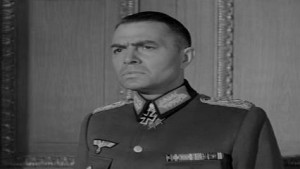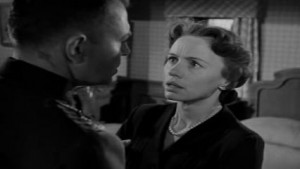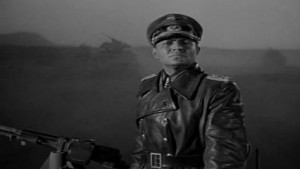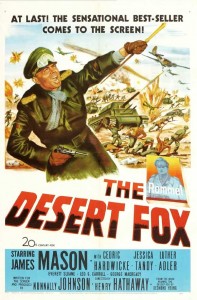From the moment the Bohemian corporal promoted himself to the supreme command of our forces, the German Army has been the victim of a unique situation: not only too many of the enemy, but one too many Germans.
Among all German generals, Erwin Rommel remains the most well-known and respected. Although the passage of time has dimmed his name recognition slightly, even during his lifetime he was perhaps the most popular and most respected of Hitler’s generals, even among the Allies.
His fame skyrocketed during the North Africa Campaigns of 1941-43 and he ultimately took a role in the German defense in Normandy. He was linked to the July 20th plot to kill Hitler and was forced to take poison in order to protect his family from repercussions from a potential show trial. The Nazis were then able to portray his death as from battle injuries and save face. The cause of his death wasn’t known truthfully until the Nuremberg Trials.
Only a few years after the war 20th Century Fox released The Desert Fox: The Story of Rommel, with James Mason in the lead role. The film paints a rather positive, if extremely limited portrayal of Rommel. This did cause some consternation at the time of release given that the scars of the war still were only partially healed.
However, perhaps part of the reason for its filming was the rehabilitation of the German persona in showing that there was resistance to Hitler. This may have done well to promote relations between the Allies and a now defeated (in 1951) Germany as the Cold War was heating up and the West could narry afford further Soviet westward influence.
 Even given almost universal praise for Rommel’s moral character and respect for his military genius, The Desert Fox glosses over much of it. Even Rommel wasn’t perfect. Yes, he did disobey orders to resettle Jews and insist that French laborers on his Atlantic Wall be paid, but his men also found him temperamental, short on patience, and extremely demanding of his subordinates.
Even given almost universal praise for Rommel’s moral character and respect for his military genius, The Desert Fox glosses over much of it. Even Rommel wasn’t perfect. Yes, he did disobey orders to resettle Jews and insist that French laborers on his Atlantic Wall be paid, but his men also found him temperamental, short on patience, and extremely demanding of his subordinates.
The Desert Fox doesn’t explain much of the man and even the pinnacle of his career (Africa) is only touched on in a cursory manner. Unfortunately most of the film is devoted to Rommel’s involvement in the plot to kill Hitler. Even today the extent of his involvement is somewhat open to debate and it most assuredly was in 1951. Sadly there was quite a bit more to the man than you will find here in this skin deep biopic.
Even at the end of the picture one doesn’t know much more than they entered the cinema with. We never find out why exactly Rommel was so successful and get only brief glimpses of his campaigns. Overall, it doesn’t give a wide or complete view of the man. Nevermind his war service in World War One or his pivotal role in the French Campaign of 1940.
James Mason brings his statue and distinctive voice to the scene, but the dialogue gives him little to work with, even though he is in almost every scene. Mainly this is exacerbated by the semi-documentary style of the picture. Mason does project the stern visage of a German Field Marshal though and creates an intelligent and somber portrayal that remains perhaps the sole reason to see this picture.
 Mason is surrounded by a potentially strong supporting cast led by Jessica Tandy as Frau Rommel. Sadly, those around him are wooden and flat characters with little to do except react to Mason. Although some would criticize the predominantly English cast, I’m not bothered by it. It wasn’t until Bruno Ganz’ portrayal of Hitler in 2004’s Downfall that we actually get a great picture with Germans speaking German. It is just a sign of the times of the era- think about how many pictures have white men playing Native Americans.
Mason is surrounded by a potentially strong supporting cast led by Jessica Tandy as Frau Rommel. Sadly, those around him are wooden and flat characters with little to do except react to Mason. Although some would criticize the predominantly English cast, I’m not bothered by it. It wasn’t until Bruno Ganz’ portrayal of Hitler in 2004’s Downfall that we actually get a great picture with Germans speaking German. It is just a sign of the times of the era- think about how many pictures have white men playing Native Americans.
Director Henry Hathaway’s heavy usage of stock footage also gives this the feel of a documentary. This in turn leads to many errors in the historical accuracy as some of the clips are clearly out of context in addition to stopping the flow of the picture.
Even more jarring is the overbearing blaring of Allied music. Hearing “Anchors Aweigh” in a movie featuring the life of a German General doesn’t really make much sense- although perhaps to further diminish any perception of elevating the public’s perception of Rommel. And most all of the music is along this vein, making what could have been an opportunity for impact a significant distraction.
 All the negatives aside, it is still an enjoyable film to watch, perhaps even more so if you don’t know anything about Rommel, as it is a fairly good introduction to him, even if the focus is in the wrong spots.
All the negatives aside, it is still an enjoyable film to watch, perhaps even more so if you don’t know anything about Rommel, as it is a fairly good introduction to him, even if the focus is in the wrong spots.
Plus Mason gives one of his signature roles, one which he would play again and lead to more of the German soldier roles of his later career such as The Blue Max, Cross of Iron, and The Boys from Brazil. His presence and performance are by far the best parts of the picture.

I have to say, I really enjoyed your honest take on Desert Fox. Mason certainly had his moments where he shined on screen and I felt he was perfectly cast here. While I would have liked the script to have gone into more detail about the life of Rommel. The topic they stuck to reminds me just how bad Valkyre was compared to Desert Fox. (Cruise not even attempting a German accent when every other actor in the film were. It was just so bizarre) But anyway, I’m glad you brought this film to the forefront so hopefully others will take the time to see it. Even if only to see Mason in such a memorable performance.
I hope you had a nice holiday week.
Page
I’ve never seen this movie despite the fact that I love James Mason. Will have to watch for it on TCM’s schedule.
When I was young, I found these movies boring. But several things have happened since then that has made this movie riveting. First, having the stock footage may be difficult to take, but it is nonetheless a million times better than your typical CGI crap. Second, whereas in the past everyone used to wonder how evil the Germans were to believe in torture and to follow immoral orders, today Donald Trump says he wants to ‘do waterboarding and even more’. Lastly, this movie is really about character, which is so missing in today’s movies, and even in things like ‘Fury’ or ‘Inglorious Bastards’ the temptation is to dwell on violent, shocking images that detract from whatever character development might occur.
Seems to me I saw this overseas during the Korean War (45,000 or so dead). I suppose this “card board” defined heroic impulse extended to our very own “Dug out Doug”. At least the uniforms,corncob pipe and desert goggles, defined these chaps.